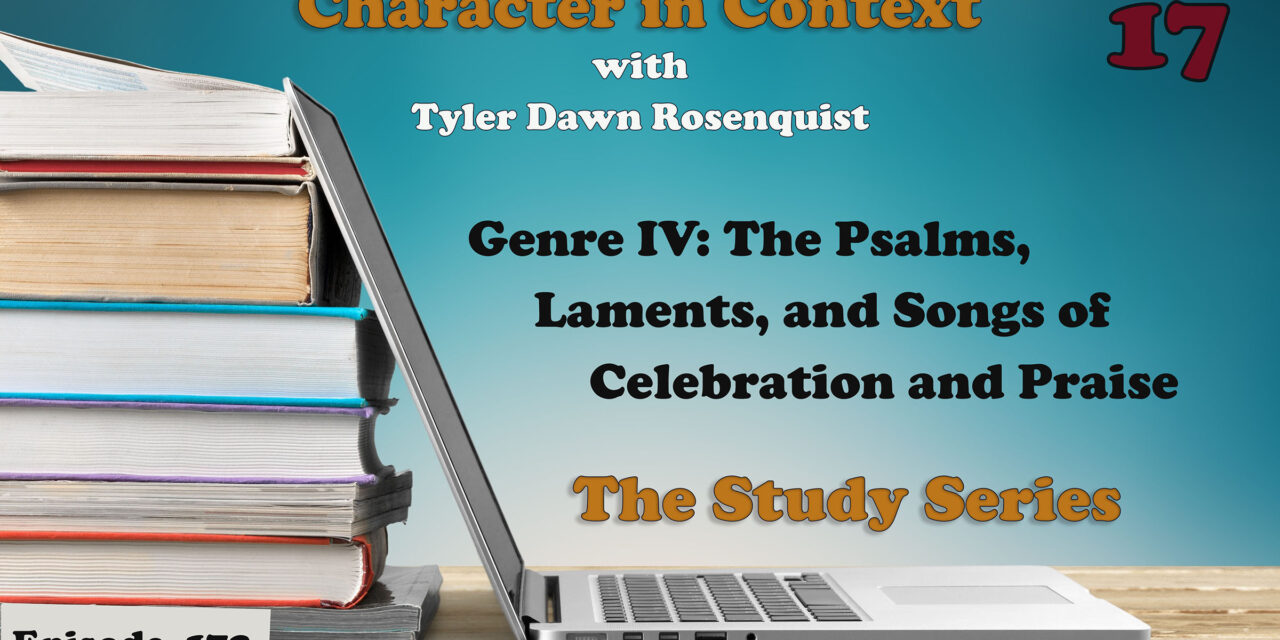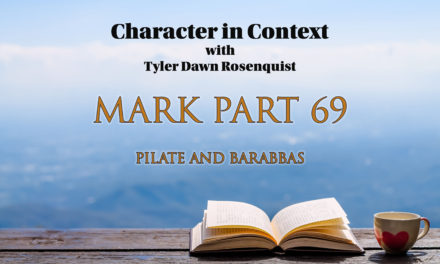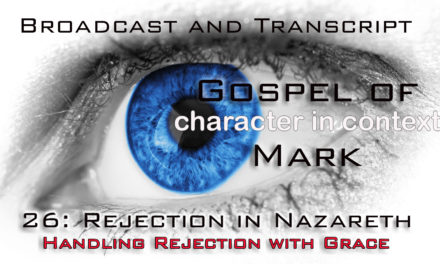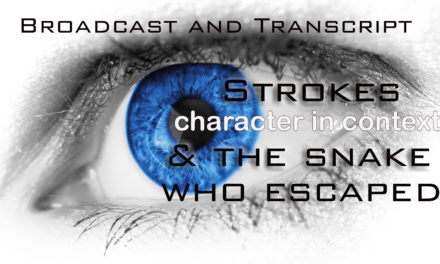How come, when forty percent of the Psalms are laments, plus whole sections of the prophets and the entire book of Lamentations, are worship songs so focused on how hunky-dory life is? Sure, some of the Psalms are praises, but there are fewer praises than sad songs of complaint and hopelessness. As my next series is going to be about the Psalms, it is important that we have a healthy and balanced perspective on how the Psalms work, what we should expect to find in them, and what they tell us about how to relate to God.
(My affiliate links for Amazon products are included in the post. As an Amazon Associate, I earn from qualifying purchases.)
I am now webcamming the recording process, which results in a slightly longer version of the teaching with a bit more nonsense than the radio show sometimes. You can catch that here.
If you can’t see the podcast player, click here.
Hi, I am Tyler Dawn Rosenquist and welcome to Character in Context, where I usually teach the historical and ancient sociological context of Scripture with an eye to developing the character of the Messiah. But not right now, right now I am doing a series about how to not waste your time with bad study practices, bad resources, and just the general confusion that I faced when I started studying the Bible and was trying to figure out what to do and whose books I should read. Bottom line, I read a lot of nonsense and spent a ton of money on it. I am going to give you some basics on how to avoid a lot of the pitfalls, save money, maximize your time and effort, and get the most out of what you are doing.
My master book list can be found on my website theancientbridge.com here and I will add to it as needed. Scripture this week comes from the CSB, the Christian Standard Bible. There are a lot of great scholarly books on the Psalms so I will be beefing up the list this week with the ones I have learned a lot from and there will be even more on the master list I will be putting together when I do the actual teaching series.
So, how many different types of Psalms would you guess there are? Many would assume that all Psalms are just straight-up works of praise but truthfully praise Psalms are in the minority. Although most Psalms have an aspect of praise within them somewhere, there are many different sorts of Psalms and they all need to be approached differently. If you have heard me teach in the past, then you know the #1 category in the Psalms is lament. That’s right—more Psalms (about 40%) are devoted to tears, complaining, or crying out to and accusing God than any other kind. In fact, I believe that the lament Psalms are the most powerful and instructive in terms of living out a relationship with God that is neither shallow nor insulting to His intelligence. To cry out is an act of profound trust in His goodness and His love.
Let’s go over some definitions that are important before delving into the Psalms. We’ve already covered the definition of lament, but the word Psalm itself is a “sacred song of praise” and the roots of the word go back into ancient Greek with a word I have gotten tired of trying to figure out how to pronounce that means to pluck a stringed instrument. A Psalmist is someone who wrote one of the Psalms and is usually anonymous. Psalter is a related word that comes from the Greek salterion, the Greek term for a type of harp, and it refers to the entire book of Psalms. Doxology is another common word that refers to a liturgical expression of praise, and liturgical is a word that refers to formal, formulaic public worship—or you could call it scripted. Doxologies are generally used to close out worship services. And you probably knew what most or all of those words meant but I didn’t want to be any more confusing than I normally am.
The Hebrew name for the book of Psalms is Tehillim—a word meaning praise. But the majority of the Book is not praise at all so how did it get that name? Well, there are a few reasons. First of all, even the laments almost always contain an aspect of praise or at least an expression of trust in God to be faithful to His covenant people. Second, the psalter is split up into five sections—each of which ends with a doxology, a formally scripted praise hymn. Third, although the Psalms are quite a mixture of different types of songs, the last six (145-150) are like the fireworks at the end of a day at Disneyland. They are just unabashed, unapologetic praise with nothing else. They are a grand celebration of the greatness of Yahweh. As we leave the reading of the Psalter in a mood of exhilaration, naming the entirety of the collection Tehillim is more than appropriate even if it is not accurate. We’ve talked a lot about the naming of Biblical books—some of them are named for the first word like Bereshith instead of Genesis, and Bamidbar for Numbers, while others are named for the traditional source for the material or the bulk of it, like Samuel, Isaiah, and Jeremiah. Samuel is dead for most of I and II Samuel but he is the focus for the beginning of the combined scroll.
This leads to the need to acknowledge that the Psalter was what scholars refer to as an “open and living book” meaning that it was open for the addition of new material for roughly a thousand years and so had numerous authors and some are given to us by name but most are not. Moses is probably the earliest psalmist and the post-exilic priests are likely the last. And so we have songs of praise and lament stretching from the time of the wilderness years to after the return from Babylon. David is the most often named author, along with the sons of Korah and Asaph, and yet we aren’t entirely sure (due to the vagaries of Hebrew conjunctions) which ones are by David, or written for David, or in the style of David. Added to that, there are fourteen named Psalms where authors and situations are given which were added later and guided how they were read but they didn’t always make logical sense and so are considered to be non-canonical—these Psalms tend to specifically be about David. We can clearly see that some of the descriptions were there before the Septuagint and others were only added later and the later Syriac added even more. It isn’t a huge deal, as the notes were added to assist worship and not in an attempt to be doctrinal.
One of the absolutely maddening things about the Psalms is that there seems to have been a deliberate decision not to sort them but to just add them in as they were either written or found. It is very likely that the Psalms of David’s time were written down and stored in libraries with other records, as well as during the time of Solomon when formal Temple worship became more and more liturgical and reproducible in nature. Certain Psalms could be sung by the pilgrims coming up to Jerusalem for the festivals, others were sung on certain festivals, and some during specific offerings. All were appropriate for public gatherings while some were likely memorized for private life and could be adapted to a specific circumstance. Let’s talk about the seven different kinds of Psalms we find not only in the Psalter but throughout the Bible. Songs and poetry are far from limited to the Ketuvim, which is the Hebrew name of the more creative books of the Bible—differentiating the Torah and the Historical Narratives from works like Job and Ecclesiastes and such.
Although all the Psalms are poetry, they aren’t poetic in the typical European sense. Although they are translated in ways to better appeal to our desire for rhythm, the Hebrew generally has no such rhythm. Instead, they relied on simile, metaphor, parallelism, personification, and repetition. And we’ve covered most of those previously so I am not going to dwell on them when we have so much material to cover and not enough time to do it in! My next teaching series will actually be on the Psalms and so we will cover all of these in-depth when we get to that. I am really looking forward to it! By repetition, I am referring to verses that have either identical or similar structure occurring throughout the Psalm that really tie the content together as a cohesive whole and can seem like rhythm but isn’t. An inclusio is what we call it when the first and last lines in the Psalm are exactly the same. And parallelism actually deserves a separate program because there are seven different types and I might do that. We’ll see. Parallelisms are usually said to equate two different lines by just swapping out nouns and verbs but in truth, that is only the tip of the iceberg. I strongly recommend Tremper Longman’s book How to Read the Psalms (affiliate link) for an introduction to this and he has some excellent recommendations for more in-depth resources.
There are seven general categories of Psalms but of course, that number will vary depending on who you ask. Some categories can be meshed together and others divided up but I think this is a really good list and it is what Longman teaches so it is a great starting place. He breaks the Psalms up into hymns, laments, psalms of remembrance, psalms of trust, psalms of thanksgiving, wisdom psalms, and kingship psalms. But keep in mind that these categories are anything but cut and dried and there is a lot of overlap in these categories, and therefore they are general and useful but not exhaustive or set in stone. This is poetry and poetry isn’t a science but an art form. It wasn’t like they had a list and it had to contain such and such elements in such and such an order. That’s how we are forced to write poetry in high school and not out in the real world when speaking to God.
Something important to understand about psalms (that you can get away without doing in reading the narratives) is that although prose (stories) can be read as stories, poetry is written creatively and often at a very deep level and must be taken in slowly and deliberately. The Psalms are meant to be read not only with the intellect but with all of the emotions in our arsenals. If we are reading the Psalms clinically, then we are not reading them as intended. Yes, they have historical context that helps us to understand where the author is coming from and it helps us to experience them but experiencing the Psalms is the whole point of them even being written down for us. They teach us how to relate to God like nothing else in the Bible. So, we are going to go through the seven main hymn types and we will do just that. The mood is incredibly important.
We understand the word hymn as being about worship, and a hymn will generally have three elements—a general calling of the people to worship, followed by giving them the reasons that they should worship or need to worship, and then a directive to keep on worshiping. If you have read some of the creation psalms or the exodus psalms, then you will recognize the pattern and the repeating themes that focus on historical provision and deliverance. Jerusalem, or Zion, also pops up quite a bit in hymns. Psalm 150 is a great example of pure worship: “Hallelujah! Praise God in his sanctuary. Praise him in his mighty expanse. Praise him for his powerful acts; praise him for his abundant greatness. Praise him with the blast of a ram’s horn; praise him with harp and lyre. Praise him with tambourine and dance; praise him with strings and flute. Praise him with resounding cymbals; praise him with clashing cymbals. Let everything that breathes praise the Lord. Hallelujah!” And make note of the repetition of the phrase “Praise Him.”
Laments are fairly straightforward and make up 40% of the Psalter. They are the most common type of psalm and can be personal or national. A person can be complaining and crying out to God or the entire nation can be. In personal laments, the writer can be obsessed with their own fears and thoughts or frustrated with God’s seeming lack of interest and/or justice, or consumed with anger and fear because of enemies. Laments are not only complaints but also petitions—they complain to God because He is the superior covenant partner and the only one who can save or forgive or provide or give justice. The lament itself is an act of trust and faith despite hopelessness. They generally start out with a calling out to God, called an invocation, like “My God why have you forsaken me?!” This is followed by asking for help in light of the covenant relationship (even if it is not mentioned because covenant is the only reason they can ask in the first place). Then come the complaints and the profession of innocence which is always hard for me to read because like, no one is innocent but when we read it as “in this situation I am blameless” it becomes easier to swallow because like, David, no, man you are messed up and you have not only sinned against God, okay? Then, sometimes there are actual curses hurled against their enemies (if there is one to be cursed), called an imprecation and these sorts of laments are actually called imprecatory psalms but they are still laments. But by the end, most laments do turn around to expressing confidence in God and blessing Him.
Laments show real relationship like no other sort of literature within the Bible. They are brutally honest. And none display that more vividly than the very disturbing Psalm 137: “By the rivers of Babylon—there we sat down and wept when we remembered Zion. There we hung up our lyres on the poplar trees, for our captors there asked us for songs, and our tormentors, for rejoicing: “Sing us one of the songs of Zion.” How can we sing the Lord’s song on foreign soil? If I forget you, Jerusalem, may my right hand forget its skill. May my tongue stick to the roof of my mouth if I do not remember you, if I do not exalt Jerusalem as my greatest joy! Remember, Lord, what the Edomites said that day at Jerusalem: “Destroy it! Destroy it down to its foundations!” Daughter Babylon, doomed to destruction, happy is the one who pays you back what you have done to us. Happy is he who takes your little ones and dashes them against the rocks.” Ouch, and yet it was an honest dry for retributive justice and I think we have all been there wanting “them” to hurt every bit as badly or more so than they hurt us.
Thanksgiving psalms are actually related to laments because they seem to happen on the other side of or in anticipation of deliverance from current circumstances. A thanksgiving psalm doesn’t really hide well because, right off, it announces an intention to praise God for such and such. And then it gives a sort of testimony of what has been going on in the life of the writer and invites all those within hearing range to join in worship and celebration of the wonderful things that God has done or is about to do. And then the problem is repeated and they talk about how God resolved the problem. It is very likely that something like this would accompany a todah (aka thanksgiving) offering at the Temple. Look at Psalm 100, “Let the whole earth shout triumphantly to the Lord! Serve the Lord with gladness; come before him with joyful songs. Acknowledge that the Lord is God. He made us, and we are his—his people, the sheep of his pasture. Enter his gates with thanksgiving and his courts with praise. Give thanks to him and bless his name. For the Lord is good, and his faithful love endures forever; his faithfulness, through all generations.”
A Confidence psalm might be a new one for you. There are only nine of them in the Psalter so not exactly as prolific as the fifty-eight laments! But these are very rich in metaphor and praise and we see just pure trust expressed in terms of God being our rock, shepherd, a strong tower, a refuge, and help. Yeah, you know exactly what I am talking about. It’s just the psalmist telling it like it is and reminding us why we can trust Yahweh. Nothing too complex. Psalm 23 is the most known example, beginning with, “The Lord is my shepherd..” but let’s look at the lesser known Psalm 11, “I have taken refuge in the Lord. How can you say to me, “Escape to the mountains like a bird! For look, the wicked string bows; they put their arrows on bowstrings to shoot from the shadows at the upright in heart. When the foundations are destroyed, what can the righteous do?” The Lord is in his holy temple; the Lord—his throne is in heaven. His eyes watch; his gaze examines everyone. The Lord examines the righteous, but he hates the wicked and those who love violence. Let him rain burning coals and sulfur on the wicked; let a scorching wind be the portion in their cup. For the Lord is righteous; he loves righteous deeds. The upright will see his face.”
Remembrance psalms are generally concerned with calling the congregation to remember the past great acts of Yahweh—if you participate in the Passover seder with a Haggadah then you know we recite a lot of them on that night. These psalms are historical in nature and very concrete and there are five of them that really fit exclusively into this category. They are heavy with references to the deliverance out of Egypt and to the establishment of David’s dynasty. They are really more concrete than most of the Psalms because the Psalmist isn’t really focused on anything except recounting the amazing signs and wonders and provision of God. As such, there are no short remembrance psalms that I will have time to read again but good examples are Psalms 135-6.
There are also four Wisdom psalms, and you might protest that all psalms contain wisdom, and although that is true, this is a specific category and these psalms are dedicated to comparing the life of the wise and virtuous against the life of the foolish or wicked. Psalm 1 is the easiest example to point out with the “blessed is the man who does not…” and in fact, let’s just go ahead and read it: “How happy is the one who does not walk in the advice of the wicked or stand in the pathway with sinners or sit in the company of mockers! Instead, his delight is in the Lord’s instruction, and he meditates on it day and night. He is like a tree planted beside flowing streams that bears its fruit in its season, and its leaf does not wither. Whatever he does prospers. The wicked are not like this; instead, they are like chaff that the wind blows away. Therefore the wicked will not stand up in the judgment, nor sinners in the assembly of the righteous. For the Lord watches over the way of the righteous, but the way of the wicked leads to ruin.” And until this was pointed out to me, it never occurred to me how much this sounds like it belongs in Proverbs instead!
The final category is the Kingship psalm which are largely about either God as our King or praising God for His blessings upon David and his descendants or petitioning God to bless them. Psalm 47 is a great example: “Clap your hands, all you peoples; shout to God with a jubilant cry. For the Lord, the Most High, is awe-inspiring, a great King over the whole earth. He subdues peoples under us and nations under our feet. He chooses for us our inheritance—the pride of Jacob, whom he loves. Selah God ascends among shouts of joy, the Lord, with the sound of a ram’s horn. Sing praise to God, sing praise; sing praise to our King, sing praise! Sing a song of wisdom, for God is King of the whole earth. God reigns over the nations; God is seated on his holy throne. The nobles of the peoples have assembled with the people of the God of Abraham. For the leaders of the earth belong to God; he is greatly exalted.”
The Psalms are very doctrinally and theologically heavy because they spend a lot of time telling us what to believe about God and His dealings with His people and how we should be living in light of that ongoing and eternal relationship. They are just a gold mine for distilling down a lot of the rest of what is in the Bible, frankly. And before we draw to a close for this week, I want to talk about three of my pet peeves when it comes to the Psalms (1) just because a person expresses a desire for violence and retribution doesn’t mean that God endorses those sentiments—Yeshua/Jesus totally put the kibosh on that as we are to bless and pray for our enemies. The Psalms represent our honest desires and feelings but not everything in them represents how God wants us to feel about things. The Psalms are an honest interaction between covenant partners and not a blueprint for what we should go out and act upon. (2) The use of the term “selah” is problematic because there is no agreement, Jewish nor Gentile, as to what it even means and I will see people write a post that they want people to think about and they will end it with “selah” but for all we know, it was a musical directive. And so, to me, it looks silly and presumptuous. It just does. Being honest here. And maybe it means “break out into wild interpretive dance.” (3) The idea that there are psalms that are purely Messianic but had no context other than predictive prophecy. All psalms are useful for the individual and what people and the nation were going through even if they ended up pointing to the Messiah with the ancient equivalent of neon-lit signs and blinding floodlights. Yes, we can find Yeshua in everything but that doesn’t mean that our goal is to focus on Him in them and thereby ignore the richness of their ability to lead us in vocalization toward God.
Next week, I want to talk about the concept of inerrancy and where it came from, and what it even means.





















